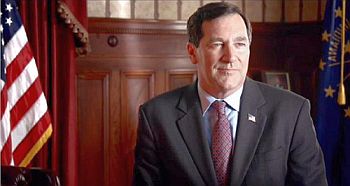 Washington D.C. – U.S. Senator Joe Donnelly Wednesday helped the Senate pass legislation that would extend the deadline for rail operators to implement positive train control (PTC) for three-to-five years. The bill passed the House and now heads to President Obama to be signed into law. The extension is for three years but also includes a waiver for an additional two-year extension on a case-by-case basis. The extension comes after Donnelly had been pressing for Congress to extend the deadline for rail operators to implement PTC.
Washington D.C. – U.S. Senator Joe Donnelly Wednesday helped the Senate pass legislation that would extend the deadline for rail operators to implement positive train control (PTC) for three-to-five years. The bill passed the House and now heads to President Obama to be signed into law. The extension is for three years but also includes a waiver for an additional two-year extension on a case-by-case basis. The extension comes after Donnelly had been pressing for Congress to extend the deadline for rail operators to implement PTC.
Donnelly said, “This is good news for our rail operators, including the South Shore Line. As we all know, the South Shore line is vital to Northern Indiana’s economy and it is a key link to Chicago and elsewhere for all our citizens.
“Railroads play an important role in our state and country’s economy. Many Hoosier passengers and businesses rely on dependable service and we could not afford a disruption of rail service. This is a responsible, bipartisan solution that will help ensure the safety of freight and passenger rail operations without creating any lapse in service. This is an example of what we can accomplish when we work together to solve problems.”
Donnelly joined a bipartisan coalition of Senators in sending a letter to Senate leadership urging Congress to extend the deadline for rail operators. Rail operators had been facing a December 31, 2015 deadline to implement PTC and many railroad companies were unable to fully implement PTC by then, which would have led to many service interruptions for commuters and freight deliveries.
In 2008, Congress required the implementation of PTC on railroads that carry passengers or have high-volume freight traffic with toxic- or poisonous-by-inhalation hazardous materials. PTC is a communications and signaling system that has been identified by the National Transportation Safety Board (NTSB) as a technology capable of preventing incidents caused by train operator or dispatcher error.
PTC is expected to reduce the number of incidents due to excessive speed, conflicting train movements, and engineer failure to obey wayside signals.














